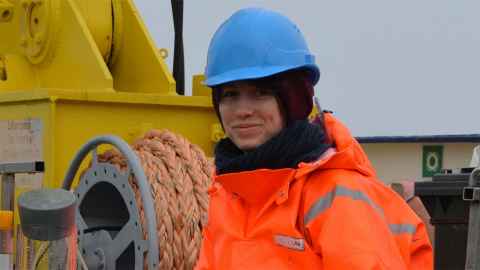Take 10 with... Ines Bartl
Dr Ines Bartl from the Institute of Marine Science discusses her research into nitrogen cycling and early indicators for eutrophication in coastal ecosystems, and her aim to better link research activities along the land-sea continuum.

1. Describe your research topic to us in 10 words or less.
Understanding nitrogen cycling within biodiverse and complex soft sediment communities.
2. Now describe it in everyday terms!
Through extensive agriculture we humans have added very high loads of nitrogen to the Earth’s ecosystems, and coastal regions suffer from it. We still don’t fully understand what happens to nitrogen in coastal ecosystems, neither in those suffering from nitrogen loads nor in healthy ones.
The reason is that nitrogen cycling is strongly linked to the biodiversity of animals and algae that live in coastal sediments. This results in a complex network of interactions and feedback loops between animals, algae and the nitrogen processes, like a huge chaotic spider web. When we learn more about this spider web-like network, we can hopefully find early indicators of stress before an ecosystem turns unhealthy.
3. What are some of the day-to-day research activities you carry out?
Because I love to do precise measurements, I spend lots of time in the lab measuring concentrations and isotopic composition of nitrogen compounds like ammonium, nitrate or organic nitrogen from water and sediment samples. To subsequently analyse these data, I also spend much time in front of my computer.
A great thing about working in marine science is to go out to the coastal study sites and do experiments, which includes a lot of organisation and preparation. Such work can never be done alone, so I interact and collaborate with other scientists and students.
4. What do you enjoy most about your research?
It is the teamwork, the variation in work and the different skills I have to apply that I enjoy most. And of course having nature as one of my work places.
5. Tell us something that has surprised or amused you in the course of your research.
What I find surprising is that in New Zealand’s coastal waters ammonium concentrations are higher than the nitrate concentrations. This is something I haven’t yet encountered during my nitrogen cycling research — in Europe we usually find nitrate to be more abundant, also under oligotrophic conditions. It seems to be unique to New Zealand’s coastal ecosystems. I wonder why this is the case…
6. How have you approached any challenges you’ve faced in your research?
One of the biggest challenges for me is the feeling of powerlessness when I see all the deteriorating effects we humans have on nature even though we know the negative consequences that scientists have addressed. I found that talking to colleagues and mentors helps a lot as we are all going through challenges together.
7. What questions have emerged as a result?
The big questions for my work here in New Zealand are how the nitrogen cycling interacts with the complexity and biodiversity of different benthic communities and whether we are able to find an early indicator for eutrophication in New Zealand’s coastal ecosystems.
8. What kind of impact do you hope your research will have?
I hope that my research will improve our understanding of coastal ecosystems and coastal nitrogen cycling and I hope I can have an impact in better linking research activities along the land-sea continuum. With both I want to support the building of conservation policies and science-based ecosystem management.
9. If you collaborate across the faculty or University, or even outside the University, who do you work with and how does it benefit your research?
I have just started at the University of Auckland and the Leigh Marine Lab this year, so I am open for new collaborations! Generally, I work with different disciplines like physical oceanographers, microbiologists and ecologists as it brings in new questions and perspectives for my research. In the future it would be great to find collaborations with freshwater scientists and councils because coastal ecosystems are one part of a wide land-sea continuum.
10. What one piece of advice would you give your younger, less experienced research self?
You are most productive when you have fun doing your research, so if you are stressed take a break (still good advice for my current research self).